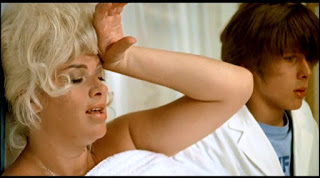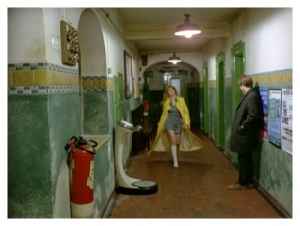Deep End (1970): Sex as Manipulation
Deep End is a tale of obsession turned violent, when naive adolescent Mike becomes attracted to his co-worker Susan. Mike’s obsession leads from deranged emotions to violent actions, due to Susan’s sexual manipulation. Deep End‘s sub-plots consists of other aspects portraying sexual behavior as abusing others. Deep End described by Adam Scovell shows sexual behavior as harrowing, ‘its highly sexualised, sometimes seedy narrative’ [1]. Scovell’s analysis reflects Deep End’s ability to reveal sex as evoking destructive behavior. Deep End‘s use of characterisation, along with symbolic use of color, has an enormous emotional and visual power in representing sex as manipulation.
Mike’s and Susan’s Relations with Others and Themselves

Deep End‘s opening scene shows Susan’s and Mike’s different personalities, as Susan makes Mike familiar with his new duties at the public swimming baths. Whereas Susan presents herself with confidence by calling Mike ‘handsome’, Mike is introverted and lacks experience. Mike was practically still a child and unaware of those who want to sexually exploit him. Mike is sexually exploited by an older female client, who dismantles sex for Mike into a destructive aspect. She makes Mike rub oil over her body before forcing his head onto her breasts. There are specific close-ups of Mike’s expressions throughout this scene, as he becomes increasingly uncomfortable. Mike’s youthful naivety is manipulated by others’ sexual desires. As a result, Mike becomes cautious with future female clients even after Susan tells him to ‘go along with the gag’, which is to say Mike should simply accept sexual manipulation.
Mike’s encounters with female clients makes him unaware of sincerity. Mike is visited by Cathy, a past acquaintance from school. Cathy is attracted to Mike, revealing her breasts and wanting Mike to sleep with her. However, Mike’s previous sexual experiences makes him reluctant to engage Cathy’s advances. Mike’s reluctance over Cathy’s sincerity reflects the impact of Susan’s sexual manipulation. This reveals Deep End‘s representation of sex as manipulation because Susan has destructively warped Mike’s mindset.

Susan’s previous comment for Mike, to ‘go along with the gag’, indicates her promiscuous character. Susan is not a victim like Mike, but a victimiser. Susan understands Mike’s growing attraction for her, using Mike’s emotions to manipulate him. Susan allows men to become attracted to her and use her body, such as her affair with the male swimming teacher. Susan is not discreet during their affair, as she has sex with the male swimming teacher at work. Mike is well aware of their affair, which can be seen as Susan sexually manipulating him to play upon his emotions. Susan continues to play with Mike’s emotions when his mother visits the public swimming baths.
Mike’s mother as a client sparks his boyish immaturity towards Susan, who responds by referring to Mike’s mother with derogatory remarks. Susan uses Mike’s emotions to further his obsession. Susan lets Mike follow her and her fiancee into a cinema, to ignite Mike’s obsession. Susan acts ignorant to Mike feeling her breasts, which she enjoys. However, Susan slaps Mike to manipulate him and tells her fiancee to have Mike removed by security. Yet Susan engages Mike in a passionate kiss before he is removed from the cinema, continuing Susan’s sexual manipulation. This is a pivotal scene which portrays Susan’s character not only as sexually manipulative, but also sexually promiscuous. Susan makes her fiancee believe he is the only one, yet there is also Mike and the male swimming teacher, adding to Susan’s sexual promiscuity.

Susan’s behavior, which increases Mike’s obsession, eventually leads to Deep End‘s tragic climax. Following an alternation where Susan loses the diamond in her engagement ring, she and Mike attempt to recover it. When Mike recovers the diamond, he hides it from Susan to manipulate her for sex. Mike’s extreme approach to sleep with Susan results from his obsession over Susan, due to her sexual manipulation. Susan is initially reluctant, however she gives into Mike and sleeps with him. Their sexual encounter is awkward as Mike tries to live his fantasy, while Susan is emotionally unconnected. The consequences for Susan’s sexual manipulation become violent, as Mike is angry at Susan’s indifference following their sexual encounter. Mike in a moment of rage hits Susan over the head, resulting in her death. Mike, still obsessed by Susan even after her death, embraces her lifeless body completing the horrific cycle of Susan’s sexual manipulation.

Deep End’s Symbolic Qualities

Deep End has the visual capability to embody its themes for great effect. The use of color within cinema has been defined as an ‘integral element of the production and circulation of film texts’ [2]. Color within Deep End is integral and extremely effective in symbolising its themes. The color red is a recurring motif, which has various uses in Deep End. Red appears in the opening scene as Mike paints his bike. It is of great significance as Mike uses his bike to stalk Susan when his obsession over her grows. Red has connotations with desire and lust, which Mike’s bike represents. Red also has connotations with anger and danger, which are emotions Susan stirred in others. When Susan exchanges derogatory remarks with the receptionist, a maintenance worker begins to paint the wall red. The wall painted red symbolically reveals Susan’s destructive behavior. Susan’s destructive behavior acts as symbolism in her death scene as her collapse into the water is juxapositioned with red paint falling into the swimming pool. The red paint falling into the swimming pool adds an eerie atmosphere of Susan’s death, which is caused by destructive emotions.

Deep End‘s use of colors is also used to the characters’ advantage. Susan uses color to entice Mike by regularly wearing a yellow coat. Yellow is a color Susan uses to deliberately make herself stand out. Susan wears her yellow coat when Mike follows her to the cinema, leading to the pivotal scene. Susan wears her yellow coat again when meeting the male swimming teacher, during a time when Mike’s obsession becomes increasingly deranged. As a result, Mike follows Susan again with disastrous results. Susan continues to orchestrate these disastrous results by wearing a black bikini while having lunch with Mike. Susan’s black bikini makes her stand out, enticing Mike and other teenage boys nearby. The teenage boys making their attraction known to Susan is exactly her intention, igniting Mike’s angry response as she enjoys manipulating him.

Deep End representing sex as manipulation through characterisation and symbolic use of color contains enormously emotional and visual power. Deep End‘s use of characterisation in contrasting Susan’s deceitful cunning to Mike’s naivety, along with their individual experiences, evokes sexual behavior as destructive. Mike’s personality becoming increasingly deranged to the point of murder is a predictable consequence for Susan’s manipulation of sexual behavior. Deep End‘s central theme extends into its symbolic use of color, where a character’s emotions or metaphorical implications is visually provocative. Deep End should be seen as a cautionary tale of sexual manipulating behavior which leads to tragic consequences, which is conveyed with contextual and symbolic power.
Works Cited
1. Scovell., A. 2014. ‘Deep End (1970) and the Musical Emphasising of Narrative (Jerzy Skolimowski)’. Celluloidwickerman.com. [Online][Accessed From] – http://celluloidwickerman.com/2014/01/16/deep-end-1970-and-the-musical-emphasising-of-narrative-jerzy-skolimowski/
2. Brown., S., Street., S. and Watkins., L. 2013. Color and the Moving Image: History, Theory, Aesthetics, Archive. Routledge.
What do you think? Leave a comment.











I admire how thoroughly you analyzed this picture Ryan, and how it serves as a contrast to most of the other films about young love that came out around that time. I think of films like Closely Watched Trains or even American Graffiti and how they showed young love as something powerful, yes, but charmingly powerful. This film, however, sounds like it shows how careful one has to be when cultivating a relationship, especially when it comes to sex. Such passions are hard to disregard and mitigate, so when you say that the film serves as a cautionary tale, I can totally see how. Though the ending has been spoiled (no fault of your own, I went in expecting it a thorough analysis) I should certainly like to see the film when I get a chance.
Thank you August
This is a movie that earns its rep.
Great movie, I just watched it and really loved. Perfect ending too… I just cant imagine how differently it could end.
For a very different ending with broadly similar themes/plot, see The Graduate (1969).
I watched this film recently as it was billed as a ‘superior British coming of age comedy drama’.
If that was the case my old age must be seeping in. A collage of clumsy sketches – some would not look out of place on the Benny Hill Show (no disrespect Benny).
What the hell was Diana Dors doing? Aargh.
The whole ending ruined the movie for me. I found it disturbing.
Why exactly do you feel the ending ruined the film? It was a logical conclusion of Deep End’s themes.
It showed how sexuality can be used as a form of control and manipulation, which gave Susan greater power over her male admirers. However this came back to haunt Susan as Mike’s obession became deadly.
The ending was meant to conveyed in this manner as it showed the extent of Mike’s obessive behavior. He choose to cling on to Susan’s dying body rather than call for help. It made for a shocking conclusion which was the right move.
I personally loved it, at points it was actually pretty surreal! Both leads were fantastic.
Absolutely dreadful and very overrated. It had a few decent moments of potential – particularly the West End sequences but they were thin on the ground. I love experimental, alternative and art-house material but this was appalling.
This is a case of The Emperor’s New Clothes where everyone raves around something because a bunch of elitist critics declare it to be vogue and only a minority have the bravery to come out and identify it as crap.
It’s the same kind of mentality that has given us pretentiousness like Gilbert & George and Turner Prize winners who’ve presented an unmade bed or a shark in formaldehyde and everyone applaudes.
Please don’t judge art-house on the basis of this flick, its just a bad film.
Deep End is a brilliant, beautiful film, by turns funny and disturbing, but always hauntingly atmospheric and memorable.
British masterpiece.
Maybe I’m lucky ~ until 3 hours ago, I had never heard of this movie at all. I was randomly browsing around youtube when I happened upon the ending of this movie (unfortunately youtube only allows a limited length upload unless you pay or something, so people upload movies incrementally). I spoiled it for myself, and wasn’t about to go back & find the beginning of it, but something about it poked at me. A half hour later, I went back, found the beginning & watched it through. No doubt the ending would’ve had more of an impact on me if I hadn’t known it was coming, but that didn’t detract from the fact that I thoroughly enjoyed the entire movie. This is coming from someone who had no prior knowledge of the movie or what anyone else thought of it. I had no preconceived notions or expectations about it. I just liked it. So I googled this movie and landed on this article, great analyses.
Thank you Kelso
Deep End is a classic, and anyone who doesn’t like has no taste.
a good 1960’s attempt at making a slightly surrealist arty film along with with some realism, , not in answer to creations like “Poor Cow” and ” Saturday Night…” etc
“Deep End” is an unique, heartbreaking classic with not only Jane Asher, but, also a masterful performance by its young and never forgotten lead actor, John Moulder-Brown, a real cult actor!
I haven’t watched the movie, but I enjoyed the analysis of it and am curious to watch and see how the things you mentioned tie the whole plot together.
I have not seen it. Thanks for writing about it. I always enjoy how directors can use color for symbolism in film. It means the films was actually thought out and encourages the audience to think.
The Chinese film Hero (2002) is renounced for its symbolic use of color.
Wow how is this deeply misogynistic take on the film the first article that appears on Google? The author clearly has some serious rage issues against women. He blames Susan for everything bad that happens to her because she uses “sex as manipulation.” First off, no one forced Mike to stalk Susan, to shame her on the subway, to cruelly withhold her wedding ring from her, and – ultimately – to kill her. This is all enormously unacceptable behavior of worsening degrees. And yet you’re saying she brought it on herself? Because she wore an attractive yellow coat? You’re the type of guy who blames a woman for getting raped because she wears a pretty dress, aren’t you? I will admit that the scene where she kisses him through the poster of the “pregnant man” was extremely flirtatious and even inviting (not inviting of rape or murder of course). However, once she realized that his affection for her was serious, she immediately puts an end to it by saying she has a fiancé. But you don’t even mention that scene. Based on your “analysis” you seem to think that, just because she’s sleeping with two men, that she “owes” sex to Mike.
It’s a shame someone let a misogynist like you write about this film because it’s highly doubtful that the director shares your view of Susan as the perpetrator of sexual cruelty and not the victim. That’s because, just before the final scene, it is revealed that the older swim teacher had sexually assaulted Susan when she was underage. She is clearly framed as the victim here.
That doesn’t mean Mike is entirely unsympathetic. He is, like many teenage boys, extraordinarily confused about sexuality. This confusion is made worse by the sexual signals he receives from both the men and women in his life. He thinks he is supposed to be some sort of sexual conqueror, and yet that’s not in his nature. And the tension between those two identities is what results in the film’s tragic conclusion.
But the fact that you think Susan is to blame for all this, and that Mike is somehow an innocent, says less about the film and more about your hatred of sexually-adventurous women. Grow up, nerd.
dave is 100% right. atrocious take…